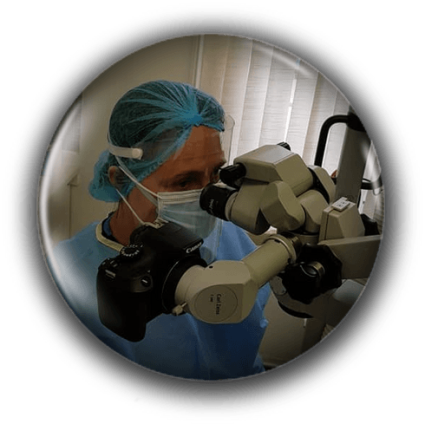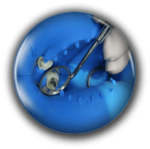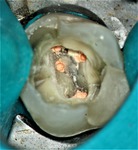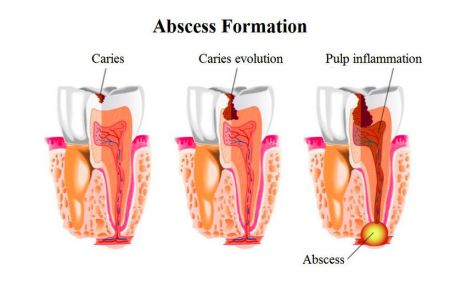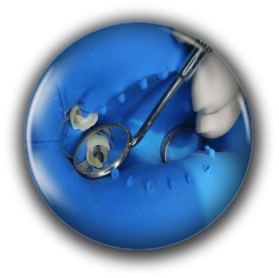If you have been reffered by your dentist or you think you need root canal treatment you can find informations below
Root canal treatment saves teeth that otherwise would need to be extracted
Every tooth has a hollow space inside where some soft tissue called the pulp lies(or the nerve). This hollow space and the pulp run all the way down through the roots of the tooth in the root canals.
When you have deep decay, a leaking filling or a tooth is cracked, the pulp of the tooth becomes inflamed and you may need root canal treatment.
The root canal treatment aims to evacuate all the content of the pulp chamber and the root canals, enlarge, disinfect then fill this space with a special material.
Because the root canals are very small in diameter and often quite long, root canal treatment can be quite a demanding procedure.
If performed properly, the rate of success for root canal treatment is in the region of 90%.
Root canal treatment should not be painful in any way as it is performed under local anesthetic.
Endodontics is the dental speciality that deals with root canal treatment.
Dr Diana Dumitriu at Park Street Dental Practice has a special interest in Endodontics. She obtained Master Of Science in Endodontics degree from University of Warwick in 2013. She always performs the root canal treatment under the microscope which provides best visibility inside your tooth, greatly enhancing the chances for success.So you couldn't be in better hands!
Root canal treatment is safely and comfortably performed with rubber dam in place. The rubber dam is a soft rubber sheet that acts like a safety net which isolates the tooth from the rest of the mouth .You can find more informations by scrolling down.
Also, visit the section about microscope in dentistry for more information.
Root canal treatment fees:
• Initial consultation including xrays £ 50.00
• Root canal treatment – incisor , canine £437.00 retreatment £484.00
--premolar £ 513.00 retreatment £583.00
--molar £ 583.00, retreatment £636.00
• Post or broken file removal £ 170.00
• Surgical endodontics(apicectomy, root hemisection) £ 421.00
Dr Diana Dumitriu Msc Endodontics
at Park Street Dental Practice in Weymouth Dorset. Practice limited to endodontics exclusively under microscope in the fully equiped endodontic dedicated suite. Taking referrals since 2012.
A tooth that has caused considerable pain is irreversible affected.
There is a hollow part of the tooth called the pulp chamber which extends down the roots as the root canals.It hosts the pulp which is made of a tiny bit of flesh , a blood vessel and a nerve.
When a tooth is cracked, has a deep filling , a deep cavity or a crown, it may allow bacteria to enter the pulp chamber.
As bacteria multiply and reach a critical level when it will cause inflamation in the pulp.
That's when the pain starts and it can be severe or moderate and the tooth becomes tender to touch.
If you seek my help at this point , I will numb the tooth and open the pulp chamber, remove the pulp and place an antisepectic inside.It will quickly stop the pain but further treatment is needed.
The next step is when the pulp becomes necrotic (dead). The blood vessel and the nerve disintegrates , so the pain stops for a while.
Now the bacteria have taken over the pulp chamber and it continues to spread. It will spread around the root causing an abcess.
Abcesses get painfull when bacteria reach a high level and there is swelling in the gum and sometimes on the face.
A short course of antibiotic may help calm an acute phase. There is no more blood vessel to carry the antibiotic inside the tooth so it does not tackle the bacteria lying inside the root canals of the tooth which continues to multiply.
That's why acute phase of on abcess will reoccur usually more often and more severe each time.
There are 2 options : extraction or root canal treatment.
Rubber dam: a must for root canal treatment
The rubber dam is a soft rubber sheet that isolates one tooth from the rest of your mouth.
It is necessary to use this protection because when doing root canal treatment , some very fine files and needles are used that could fall at the back of your mouth creating a chocking hazard. The rubber dam safely protects you.
Also , to disinfect the root canals a very strong disinfecting bleach based solution is used. The rubber dam stops it leaking into your mouth.
The rubber dam gently pulls your cheeks and your tongue away so that the dentist can see and work better.
Most people tolerate the rubber dam very well. Some worry about breathing because they may have the nose blocked.The rubber dam can be cut in such a way to allow easy breathing.Talk to the dentist about it!
If you are a patient and you have been offered root canal treatment , you will be required to read and sign the following consent:
Root canal treatment informed consent
- Your signature does not commit you to any treatment. Occasionally, medication will be prescribed by Dr Diana Dumitriu. Medications prescribed for discomfort and/or sedation may cause drowsiness, which can be increased by the use of alcohol or other drugs. We advise that you do not operate a motor vehicle or any hazardous device while taking such medications. In addition, certain medications may cause allergic reactions, such as hives or intestinal discomfort. If any of these problems occur, call the practice immediately. It is the patient's responsibility to report any changes in his/her medical history to your endodontist.
- I understand the root canal therapy is a procedure that retains a tooth, which may otherwise require extraction. Although root canal therapy has a very high degree of success, results cannot be guaranteed. Occasionally, a tooth, which has had root canal therapy, may require retreatment, surgery, or even extraction. Also during the treatment there is a risk of extruding or swallowing small amounts of a highly irritant disinfecting solution or root canal sealer which may lead most of the times to self-limited complications and only in very isolated cases to long lasting consequences such as persistent numbness or pain of the lip, chin, tongue or maxillary sinusitis. However, the risk is extremely small and all efforts will be put in preventing it.
- Calcified canals preventing endodontic therapy through the entire length of the root may lead to extended treatment time or the need of additional appointments (which will NOT be charged extra).
- Following treatment, there may be discomfort or pain when pressing on the tooth, soreness on the gums and areas around the tooth, moderate to severe swelling ussually easily remited withing 7-10 days that may require antiinflamatory and/or antibiotic therapy.
- The treated tooth may be brittle and subject to fracture. A restoration (filling), crown and/or post and core will be necessary to restore the tooth, and your general dentist will perform these procedures. During endodontic treatment, there is the possibility of instrument separation within the root canals, perforations (extra openings), damage to bridges, existing fillings, crowns or porcelain veneers, missed canals, loss of tooth structure in gaining access to canals, and fractured teeth. Also, there are times when a minor surgical procedure may be indicated or when the tooth may not be amenable to endodontic treatment at all. Other treatment choices include no treatment, a waiting period for more definitive symptoms to develop, or tooth extraction. Risks involved in those choices might include, but are not limited to, pain, infection, swelling, loss of teeth, and infection to other areas.
- All of my questions have been answered by my endodontist and I fully understand the above statements in this consent form.
- Furthermore, I give Dr Diana Dumitriu my permission to voice record, tape digitally, videotape and/or take digital photos of my procedure for purposes of completing my medical record and/or for patient education.
- Note: All medical records will be kept strictly confidential.


